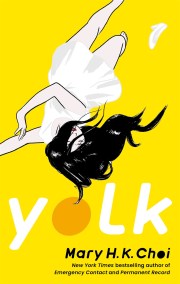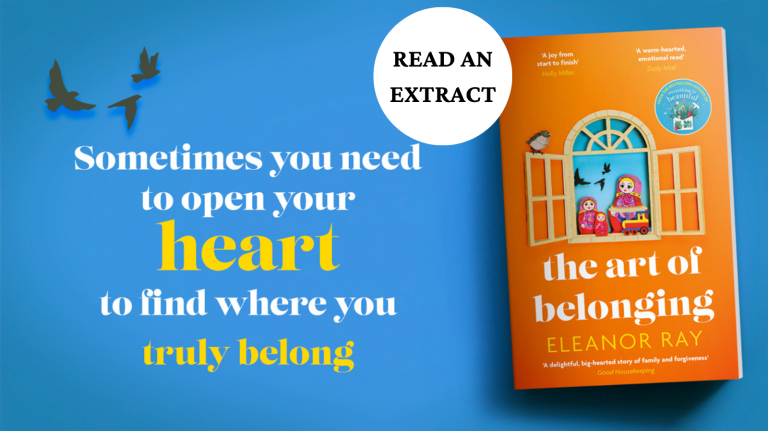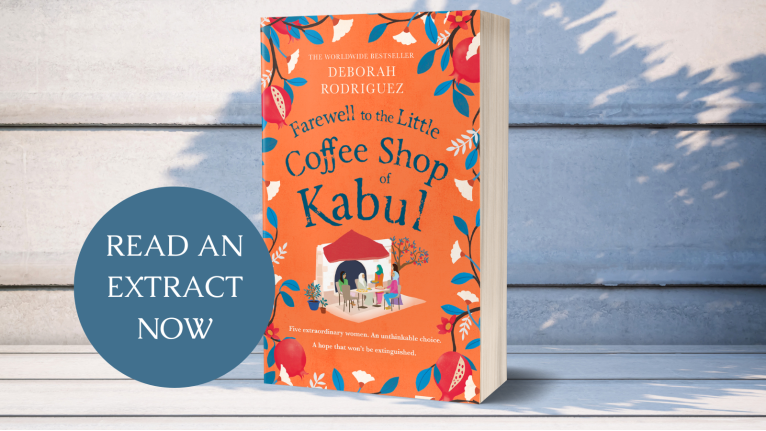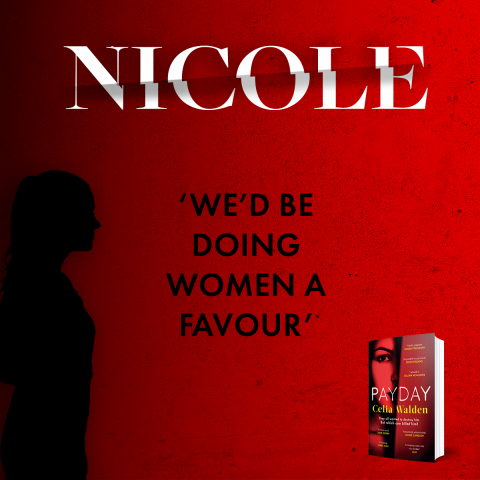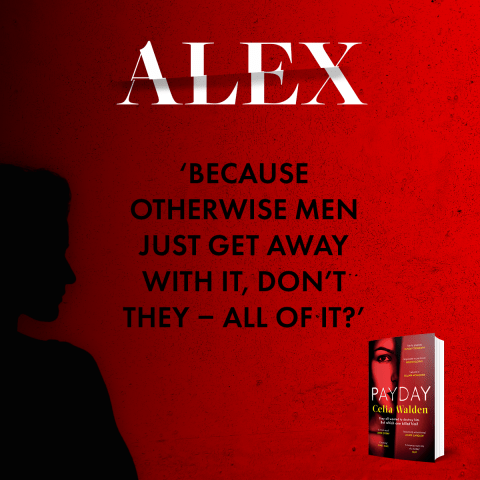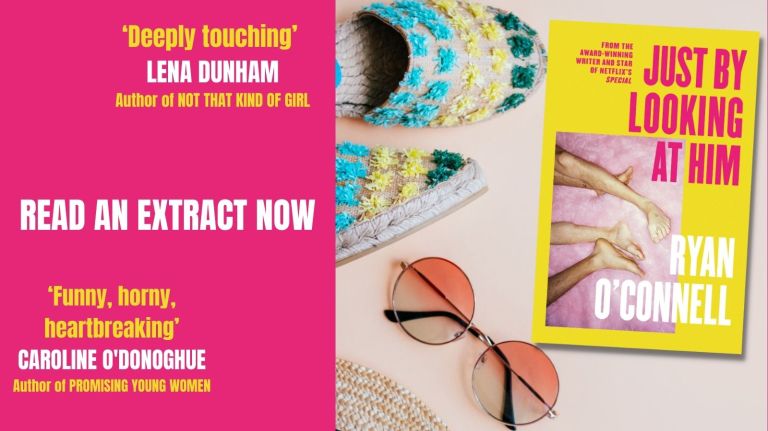Read an extract from Yolk by Mary H. K. Choi
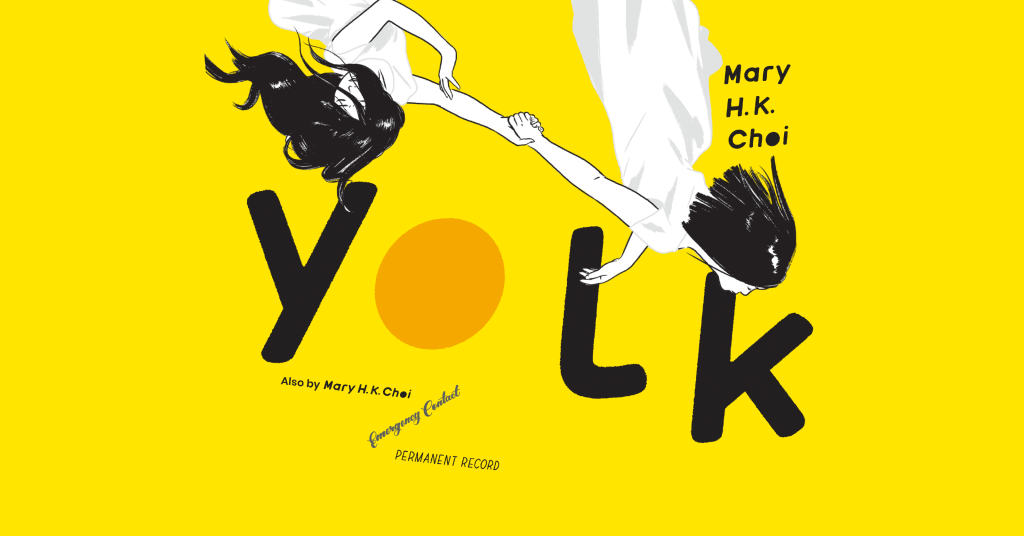
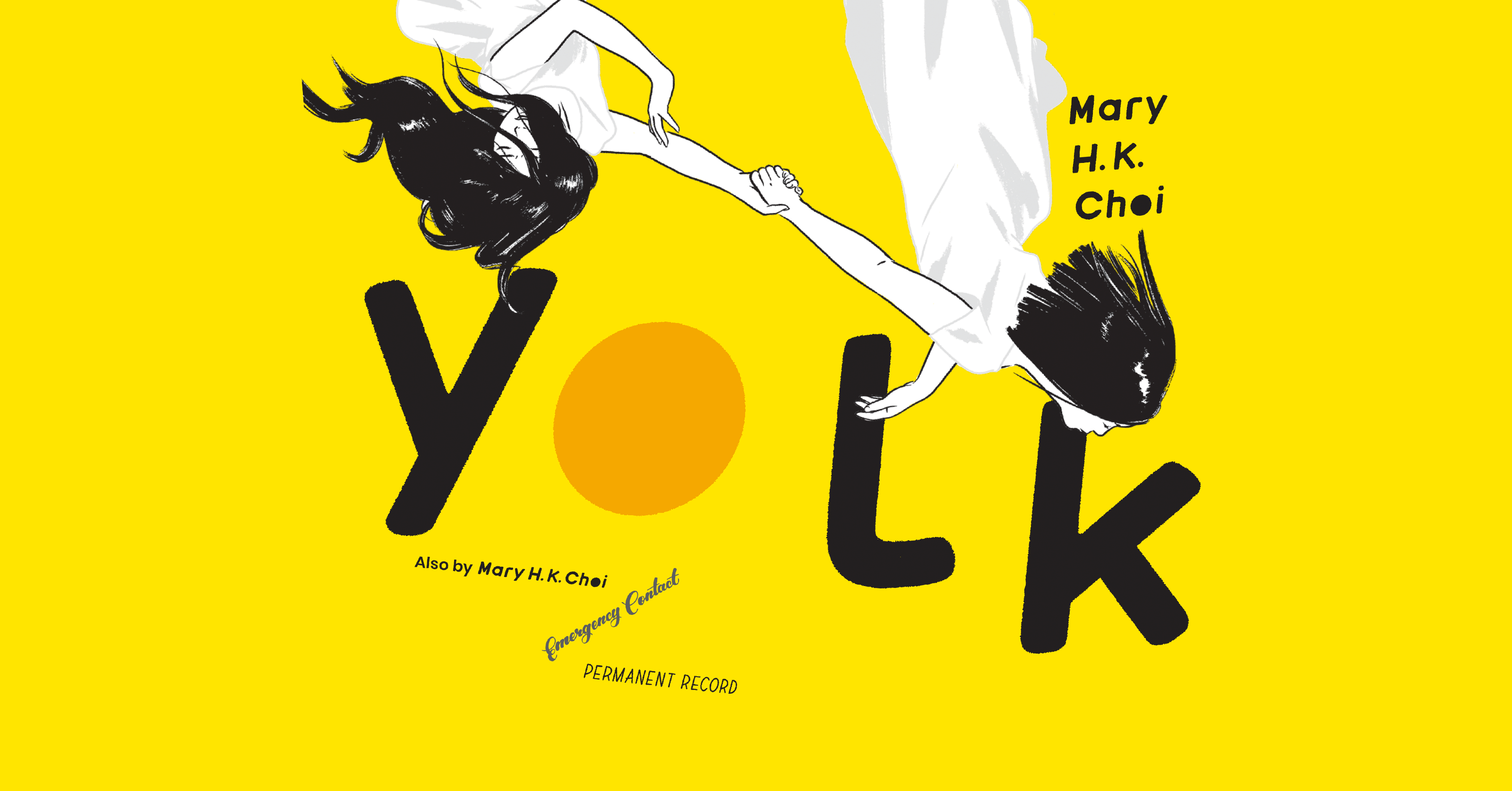
From New York Times bestselling author Mary H.K. Choi comes a funny and emotional story about two estranged sisters and how far they’ll go to save one of their lives – even if it means swapping identities.
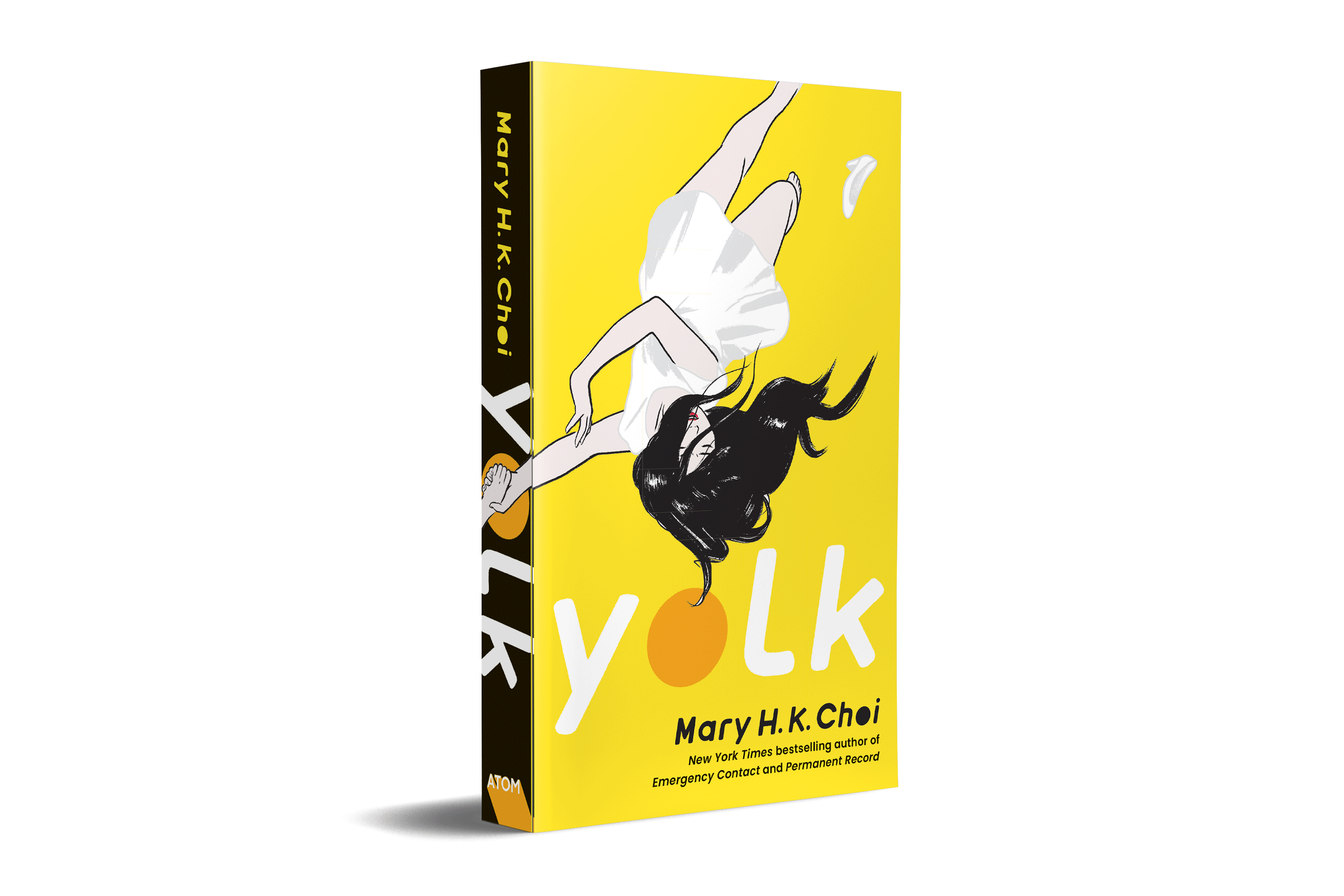
CHAPTER ONE
Depending on where I focus and how much pressure I apply to the back of my throat, I can just about blot him out. Him being Jeremy. Him who never shuts up. Him being my ex. He whose arm is clamped around the back of the café chair that belongs to another girl. She’s startlingly pretty, this one. Translucent and thin. Achingly so. She has shimmering lavender hair and wide-set, vacant eyes. Her name is Rae and when she offers her cold, large hand, I instinctively search her face for any hint of cosmetic surgery. Her lids, her lips, the tip of her nose. Her boots are Ann Demeulemeester, the ones with hundreds of yards of lace, and her ragged men’s jacket, Comme.
“I like your boots,” I tell her, needing her to know that I know, and immediately hating myself for it. I’m so intimidated I could choke. She smiles with such indulgent kindness I feel worse. She’s not at all threatened by me.
“I got them here,” she tells me in faultless English. I don’t ask her where there might be.
Jeremy says I’m obsessed with other women. He might be right. Then again, someone once described Jeremy’s energy to me as human cocaine, and they were definitely right.
“Mortifying.” He shudders, blotting his slick mouth with a black cloth napkin. Jeremy’s the only one eating a full-on meal here at Léon. A lunch of coq au vin. I draw in a deep breath of caramelized onion. All earthy, singed sugar.
“Can you imagine failing at New York so publicly that you have to ‘move home’?” He does twitchy little scare quotes around the last bit. He does this without acknowledging that for him, moving home would be a few stops upstate on Metro-North, to a town called Tuxedo. A fact he glosses over when he calls himself a native New Yorker.
I watch Rae, with a small scowl nestled above her nose, purposely apply a filter on her Instagram Story. It’s her empty espresso cup at an angle. I lean back in my wicker café chair and resume lurking her profile, which I can do in plain sight because I have a privacy shield.
It’s the typical, enigmatic hot-girl dross on her main feed, scones cut out onto a marble surface dusted with flour, her in a party dress in a field. A photo of her taking a photo in a mirror with a film camera.
In an image farther down, Rae is wearing a white blouse and a black cap and gown. Grinning. It’s a whole different energy. When I arrive at the caption, I close my eyes. I need a moment. I some-how sense the words before they fully register. She graduated from Oxford. It’s crushing that most of the caption is in Korean. She’s like me but so much better.
My will to live leeches out of my skin and disappears into the atmosphere. I should be in class. I once calculated it, and a Monday, Wednesday, Friday course costs forty-seven dollars, not counting rent. Counting rent in this city, it’s exactly one zillion.
“Yeah, hi.” Jeremy flags down a passing server. A curvy woman with a tight Afro turns to us, arms laden with a full tray of food. “Yeah, can you get me a clean glass of water?” He holds his smeared glass to the light.
“I can,” she says through her teeth, crinkling her eyes and nodding in a way that suggests she’s garrotting him in her mind.
“That’s not our server,” I whisper when she leaves. As a restaurant kid, albeit a pan-Asian strip-mall operation that charges a quarter for to-go boxes, I cringe with my whole body. Jeremy shrugs.
I check myself out in the strip of antique mirror behind Rae’s and Jeremy’s heads. I swear my face is wider now than it was this morning. And the waistband of my mom jeans digs into my gut flesh, stanching circulation in my lower belly and thighs. I can feel my heartbeat in my camel-toe. It’s a dull pain. A solid distraction from this experience. I wonder if they were talking about me before I arrived.
I eye the communal french fries. Saliva pools in the back of my gums. Ketchup is my kryptonite. Especially swirled with ranch dress-ing, which I’ve trained myself to give up. The Raes of the world would never. Or they would and it would be quirky and wholesome.
Her leg is the circumference of my arm.
I smile at the room in a way I imagine would appear breezy yet bored in a film about heartbreak. I love this place. You’d never guess that a dumpy French restaurant from the seventies would be the new hotspot, but that’s the other thing Jeremy’s good for: knowing the migratory practices of various clout monsters. That and ignoring the tourists as he sweet-talks Oni the hostess into ushering us past the busy bar and into the seats in the way, way back.
Someday I’m going to eat a meal in a New York restaurant by myself without burning with shame.
“I have to get this dog, right?” interrupts Rae, lifting a fry to her mouth. When she chews, a pad of muscle pulses at her temples. She leans into me and shows me a Pomeranian puppy. “I want a rescue, but look at him.” She strokes the photo with her thumb. “I don’t know if I can wait.”
I glance at Jeremy, who’s paused with his fork raised to his mouth. “What time is our thing?” he asks her.
“What thing?” It’s out before I can think.
Rae’s eyes flit to Jeremy’s and skitter back to me.
They let my question hang in the air like a smell.
“Oh, don’t worry,” I recover, smiling stiffly. “I have plans.”
“No, come!” exclaims Rae, squeezing my forearm for emphasis.
“God, I’m so awkward.” She laughs at herself ruefully. “It’s just an intimate gathering at a dear friend’s home. It’s a safe space, so I have to make sure it’s okay.” Her eyes narrow meaningfully, placing an open palm on my leg. “But if it’s a no, I hope you can respect that it’s nothing personal.”
“Honestly,” I tell her, convinced that all her friends are sylphlike and terrifying. “I have to leave right after this.”
Jeremy pushes his plate away. I hand him my water before having to be asked. His eyes dart past me to beetle all around us. Party eyes. Shiny. Hard. Roving for people to say hello to. I get it. I love New York precisely for this reason. The culture. The vibration. The relevance. The crackly frisson of opportunity. When we first met, it was this gleaming, hungry aspect of him that I liked best. His magnetism was contagious, especially when he motormouthed at you about his grand plans. You felt like you were on his team.
He pulls his sunglasses out and cleans them with my napkin. Not so long ago he was beautiful to me. Partly because he’s tall. Not even New York tall but objectively tall. Over six feet. But it was his ambition that drew me to him. I’d never met anyone who could talk at that pace. It was astonishing. But now, I can see him how others might. His straw-blond hair and skin tone blend his features together in a vague soup, blurring an already uncertain chin.
But then he’ll say something so quintessentially, winsomely New York that I’m scared to let him go. And he knows everyone. From models to door guys. Once we ordered weed to the house and it turned out he played basketball with the delivery dude. When they gave each other a pound, I was so envy-struck I could barely speak. It doesn’t help that on the rare occasion Jeremy introduces me to his friends—their eyes glaze over in disinterest.
Jeremy calls himself a poet. And a performance artist. But, for him, neither of these things particularly mean anything, and combined they mean even less. Mostly he focuses his efforts on a literary magazine that I’ve designed pages for but never seen in real life. In short, he’s a bartender at Clandestino over on East Broadway. I try not to think about how much money he owes me. And how we shared a bed for months and then stopped.
The only time I don’t hate him is when I think he’s mad at me. “I’d rather die than go home,” I say to no one in particular.
CHAPTER TWO
“Be right back.”
I get up, grab my wallet, and thread my body through the crowd by the bar. I swallow hard, guts curdling. I feel callow and gullible and unspeakably sad. I need to forget how, at an earlier point in the day, I’d dressed as though my loose plans with Jeremy were a date.
“Hey, Mike.” I up-nod the bartender, weirdly a near dupe of Jeremy but with a pornstache and more tattoos. “Hey, baby, what can I get you?” I’m heartened that he seems to remember me without Jeremy as a cue. “Vodka soda. The cheap kind.”
I always get my drinks separately. I’m too poor to split bills at the table. “I’m going to need to see an ID, babe.” I hand it over, and he gives me a heavy pour. “You want to keep the tab open or closed?”
“You can close it out,” I tell him, sliding him my credit card.
“Thanks.”
He hands me a sweating glass. Part of me already doesn’t want it. I take a sip right where I stand, ignoring the glares and pointy elbows of couples waiting for their tables. The drink’s strong. And thoroughly disgusting. I feel it work immediately.
I pocket the credit card and fake ID. It’s funny how no one ever notices that the names don’t match. And that the photo isn’t my face. Partly it’s that they don’t expect criminals to look like me, an Asian art student dressed in black, but it also confirms a horrible suspicion: that no one’s ever looking at me. Really looking.
I’m staring at the halo of her before recognition kicks in. There she is, in the mirror behind the bar. Like an apparition. A Japanese horror movie. I want to laugh, I’m in such disbelief. She pushes through the crowd, scanning the clustered bistro tables by the front window, openly searching their faces. When she falls out of frame, I almost turn my head toward her but hesitate—superstitious—thinking that she won’t be there. I lift my hand to my lips, watching my reflected self do the same, confirming my own presence as she double backs toward me. Now we’re both in the mirror, and still I don’t face her. She has different hair—shorter—but it’s ludicrous how enormous her gourd is. Even without our nursery-rhyme names—Jayne and June—you’d see how we belong to each other. Our heads are twinned in bigness.
The joke goes that I practically slid out of Mom after she’d pushed June out. Even after the two-and-change-years between us. Normal-size heads look as though they’d orbit mine, and my sister’s is even huger. The other joke is that June, eleven days late, at eleven pounds and two ounces, hadn’t wanted to come out at all. She’s like one of those parasitic eggs that hatch on a caterpillar, casually eating it for sustenance, using it for shelter without any sense of imposition. If June had her way, she’d have kept growing and worn Mom like a hat.
The last time I saw her, I hid. She’d been transferring for the uptown 4 at Union Square. Her nose was buried in her phone and she was wearing a slate-gray businesswoman’s dress to the knees, looking like someone I’d never be friends with.
It’s only then that I realize: My sister is looking for me.
With my back pressed against the wall, I wait for her to reach me like a Venus flytrap. I steal a glance back to my table. Rae and Jeremy are both on their phones.
She startles when I grab her. “What are you doing here?” I whis-per angrily, pulling her behind the hostess section and pinning her, hiding us both. She knows better than to lie. This isn’t her part of town. I quickly assess her appearance. She’s dressed all wrong. The baseball cap on her head reads DARPANA MUTUAL. The putty-colored trench I recognize, but under it is a strange orange shirt, swishy silver workout pants, and ultramarine rubber clogs.
“Why aren’t you in class?” she demands, shaking me off her arm and pulling away. I scoff. It’s so classic. Of course this is the first thing she says to me in almost a year.
“Why aren’t you at work?” I counter. “And what are you wearing?” I haven’t seen her out of a suit in years. Honestly—and this is fucked up—she’s dressed like a rural Chinese person on holiday. I take a step away from her. I want to make clear to anyone observing that we are not together. That this is an intrusion.
“I’ve been calling,” she says. I feel her eyes land judgily on the glass in my hand. I take a long sip, holding her gaze.
“I left, like, three voicemails,” she continues.
“I didn’t see them,” I lie. All of the messages were “Call me.” “You’re so unreliable.”
“So, you stalked me?”
“I wouldn’t call it stalking,” she says. I need to stop geotagging everything. I forget that my sister’s even on Insta. The last thing I saw on her grid was from Halloween, where she’s dressed as a Yu-Gi-Oh! character. It stressed me out so much, I muted her.
She crosses her arms archly. “You know, you could have just gone to San Antonio Community College if you’re hell-bent on being some lush,” she finishes.
I’m tempted to smack her, but we’re mushed against the wall by a party of four inching past us.
“Seriously, what the fuck?” I whisper angrily. “What are you doing here?” For a second we’re back in high school. My adrenaline’s spiked. I slide my left foot back for stability.
But instead of pushing or shoving, she takes a deep breath and refuses my eye. My heart judders.
“Fuck, is it Mom?” I ask. She’s dead. I’m totally convinced of it. It’s the only thing that would make my sister come see me like this.
“No,” she says. “But we have to talk.”
“So, talk, fuck.” My indignation sounds performative even to me.
I realize I’m drunk. The glass in my hand is suddenly empty.
“How are you?” she asks conversationally, doing this little brow-knitting concerned thing.
“You can’t be serious.” Truth is, she’s really beginning to frighten me. This isn’t who we are to each other.
“Fine,” she says quickly. “But I don’t want to tell you here.” She reaches for me. I recoil so fast, her nails scrape my bare forearm. I raise it between us, glaring accusingly even though it doesn’t hurt. We stand there, the radiant resentment between us throbbing.
“My friends are waiting for me,” I counter, practically in singsong. It’s old hat that I goad my sister this way. Flaunting my comparative popularity. I dislike myself as I do it.
“Look,” she says. “It’s not Mom, but it’s important. Text me when you’re done. I’ll send a car.”
“Fine,” I tell her.
Jeremy barely glances at me as I sit down. “How is it privilege if it’s a lottery? Nobody asks to be white. Especially nowadays.” It genuinely pains me to rejoin this conversation. “It’s a class issue, not a race issue. That’s the scam. Why is it practically illegal for cis, het, white men to have any cultural relevance anymore?”
“You know,” Rae says, gaze trained on her phone. “I think we can take the J train over.”
I grab my coat and bag. “I just have to . . .” As I head toward the front, the bathroom door swings open. The dappled glass pane that reads TOILETTE almost hits me in the face. I let myself in and twist the lock shut. It’s tiny. A single commode and a gemlike sink in the corner. The coffin-sized room features floral wallpaper and the kind of European flusher where you pull down the knob on a chain.
I collect bathrooms in the city. I like knowing where they are. The LGBT center in Chelsea with the Keith Haring mural on the second floor. Whole Foods on Bowery in the back of the food court with a passcode on any receipt. The tiled floral beauty of the New Museum stairwell, where you can catch video installations for free. Dank Irish dive bars all over the East Village also make for safe refuge, and they’re always open. The real winners are in hotels and certain clubs. The ones that feature stall doors that go from the floor all the way up to the ceilings, those are best for secrets.
I pee and check my phone for a while. Just enough to make June wait.
When I glance back at the table, it’s empty.

